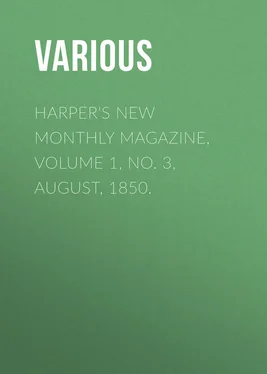Various - Harper's New Monthly Magazine, Volume 1, No. 3, August, 1850.
Здесь есть возможность читать онлайн «Various - Harper's New Monthly Magazine, Volume 1, No. 3, August, 1850.» — ознакомительный отрывок электронной книги совершенно бесплатно, а после прочтения отрывка купить полную версию. В некоторых случаях можно слушать аудио, скачать через торрент в формате fb2 и присутствует краткое содержание. Издательство: Иностранный паблик, Жанр: periodic, foreign_edu, на английском языке. Описание произведения, (предисловие) а так же отзывы посетителей доступны на портале библиотеки ЛибКат.
- Название:Harper's New Monthly Magazine, Volume 1, No. 3, August, 1850.
- Автор:
- Издательство:Иностранный паблик
- Жанр:
- Год:неизвестен
- ISBN:нет данных
- Рейтинг книги:5 / 5. Голосов: 1
-
Избранное:Добавить в избранное
- Отзывы:
-
Ваша оценка:
- 100
- 1
- 2
- 3
- 4
- 5
Harper's New Monthly Magazine, Volume 1, No. 3, August, 1850.: краткое содержание, описание и аннотация
Предлагаем к чтению аннотацию, описание, краткое содержание или предисловие (зависит от того, что написал сам автор книги «Harper's New Monthly Magazine, Volume 1, No. 3, August, 1850.»). Если вы не нашли необходимую информацию о книге — напишите в комментариях, мы постараемся отыскать её.
Harper's New Monthly Magazine, Volume 1, No. 3, August, 1850. — читать онлайн ознакомительный отрывок
Ниже представлен текст книги, разбитый по страницам. Система сохранения места последней прочитанной страницы, позволяет с удобством читать онлайн бесплатно книгу «Harper's New Monthly Magazine, Volume 1, No. 3, August, 1850.», без необходимости каждый раз заново искать на чём Вы остановились. Поставьте закладку, и сможете в любой момент перейти на страницу, на которой закончили чтение.
Интервал:
Закладка:
Early in the afternoon I dispatched men with a pack-horse to bring the finer of the two buffalo-heads. It was so ponderous that two powerful men could with difficulty raise it from the ground. The Bechuanas who had accompanied me, on hearing of my success, snatched up their shields and assagais, and hastened to secure the flesh, nor did I see any more of them, with the exception of the two Baquaines, who remained with me, being engaged in a plot with my interpreter to prevent my penetrating to Bamangwato. Isaac did not soon forget his adventure with the buffaloes; and at night over the fire he informed my men that I was mad, and that any man who followed me was going headlong to his own destruction. At an early hour on the 5th, I continued my march through a glorious country of hill and dale, throughout which water was abundant.
EARTH'S HARVESTS
Two hundred years ago, 6 6 Naseby, June 14, 1646.
the moon
Shone on a battle plain;
Cold through that glowing night of June
Lay steeds and riders slain;
And daisies, bending 'neath strange dew,
Wept in the silver light;
The very turf a regal hue
Assumed that fatal night.
Time past – but long, to tell the tale,
Some battle-ax or shield,
Or cloven skull, or shattered mail,
Were found upon the field;
The grass grew thickest on the spot
Where high were heaped the dead,
And well it marked had men forgot,
Where the great charge was made.
To-day – the sun looks laughing down
Upon the harvest plain,
The little gleaners, rosy-brown,
The merry reapers' train;
The rich sheaves heaped together stand,
And resting in their shade,
A mother, working close at hand,
Her sleeping babe hath laid.
A battle-field it was, and is,
For serried spears are there,
And against mighty foes upreared —
Gaunt hunger, pale despair.
We'll thank God for the hearts of old,
Their strife our freedom sealed;
We'll praise Him for the sheaves of gold
Now on the battle-field.
BIOGRAPHICAL SKETCH OF THE LATE PRESIDENT
Who has not heard of the opening words with which the court preacher Massilon startled the titled throng who had gathered in Notre Dame to do the last honors to that monarch whose reign was the longest and most splendid in French annals, " God only is great! " How often does the knell of vanished power repeat the lesson! How constantly does the fleeting away of our own men of might teach us that
The paths of glory lead but to the grave!
Death has again asserted his supremacy by striking down the most exalted ruler of the land. The last sad cadence, dust to dust, his just been faltered aver one who was our country's pride, and joy, and strength. The love, the gratitude, and the veneration of a nation could not save him. The crying need of an imperiled republic could not reprieve him. His mortal strife over, his appointed task finished, he went down into the cold embrace of the grave, and there, like a warrior taking his rest, he lies and will lie forever. But he has left behind him what can not die, the memory of noble aims and heroic deeds. The plain story of his life is his best eulogy.
Zachary Taylor was born in Orange County Virginia, in November, 1784. He was the second son of Col. Richard Taylor, whose ancestors emigrated from England about two centuries ago, and settled in Eastern Virginia. The father, distinguished alike for patriotism and valor, served as colonel in the revolutionary war, and took part in many important engagements. About 1790 he left his Virginian farm and emigrated with his family to Kentucky. He settled in the "dark and bloody ground," and for years encountered all the trials then incident to border life. The earliest impressions of young Zachary were the sudden foray of the savage foe, the piercing warwhoop, the answering cry of defiance, the gleam of the tomahawk, the crack of the rifle, the homestead saved by his father's daring, the neighboring cottage wrapped in flames, or its hearth-stone red with blood. Such scenes bound his young nerves with iron, and fired his fresh soul with martial ardor; working upon his superior nature they made arms his delight, and heroism his destiny. Zachary was placed in school at an early age, and his teacher, who now resides in Preston, Connecticut, still loves to dwell on the studiousness of his habits, the quickness of his apprehension, the modesty of his demeanor, the firmness and decision of his character, and a general thoughtfulness, sagacity, and stability, that made him a leader to his mates and a pride to his master.
After leaving school, the military spirit of young Taylor was constantly fanned by the popular excitement against the continual encroachments of England; and soon after the murderous attack of the British ship Leopard upon the Chesapeake, in 1808, he entered the army as first lieutenant in the 7th regiment of infantry. He soon gained distinction in border skirmishes with the Indians, and the declaration of war with England found him promoted to the rank of captain. Within sixty days after the commencement of hostilities in 1812, the imbecility of Hull lost to the country its Michigan territory, and fearfully jeoparded the whole northwestern region. It was of the utmost importance to intrust the few and feeble forts of that great dominion to men of established valor and discretion. Captain Taylor was at once invested with the command of Fort Harrison, situated on the Wabash, in the very heart of the Indian country. The defenses of this post were in a miserable condition, and its garrison consisted of only fifty men, of whom thirty were disabled by sickness. With this little handful of soldiers, the young commander immediately set about repairing the fortifications. He had hardly completed his work, when, on the night of the 4th of September, an alarm shot from one of his sentinels aroused him from a bed of fever, to meet the attack of a large force of Miami Indians. Every man was at once ordered to his post. A contiguous blockhouse was fired by the enemy, and a thick discharge of bullets and arrows was opened upon the fort. The darkness of the night, the howlings of the savages, the shrieks of the women and children, the fast approaching flames, and the panic of the debilitated soldiers, made up a scene of terror, but could not shake the determination nor the judgment of the young chieftain. He inspired his men with his own courage and energy. The flames were extinguished, the consumed breast-works were renewed, and volley answered volley for six long hours till day break enabled the Americans to aim with a deadly precision that soon dispersed their foes. This gallant repulse, at odds so unfavorable, prompted a report from Major General Hopkins to Governor Shelby that "the firm and almost unparalleled defense of Fort Harrison had raised for Captain Zachary Taylor a fabric of character not to be affected by eulogy;" and forthwith procured from President Madison a preferment to the rank of brevet major, the first brevet, it is said, ever conferred in the American army.
Major Taylor continued actively engaged throughout the war; but, being without a separate command, he had no opportunity to again signalize himself by any remarkable achievement. After the treaty of peace, he remained at the West, faithfully performing his duties at different military posts, and preparing himself for any future call to more active service. In 1832, he was promoted to the rank of colonel; and soon after the opening of the Florida war, he was ordered to that territory. Here he was in constant service, and distinguished himself for his discretion and gallantry in circumstances of the most trying difficulty and peril. His entire career won for him universal esteem and confidence.
Читать дальшеИнтервал:
Закладка:
Похожие книги на «Harper's New Monthly Magazine, Volume 1, No. 3, August, 1850.»
Представляем Вашему вниманию похожие книги на «Harper's New Monthly Magazine, Volume 1, No. 3, August, 1850.» списком для выбора. Мы отобрали схожую по названию и смыслу литературу в надежде предоставить читателям больше вариантов отыскать новые, интересные, ещё непрочитанные произведения.
Обсуждение, отзывы о книге «Harper's New Monthly Magazine, Volume 1, No. 3, August, 1850.» и просто собственные мнения читателей. Оставьте ваши комментарии, напишите, что Вы думаете о произведении, его смысле или главных героях. Укажите что конкретно понравилось, а что нет, и почему Вы так считаете.












